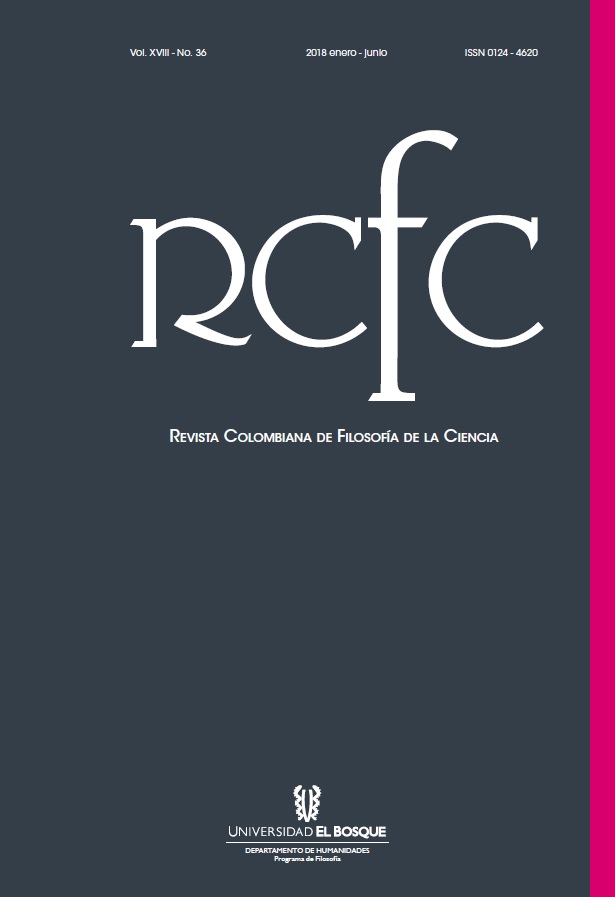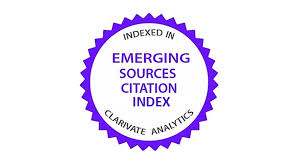The Frame Problem and the Aptitude of Emotions to Solve the Difficulty of Regression
DOI:
https://doi.org/10.18270/rcfc.v18i36.2117Keywords:
Cognitive sciences, relevance issues, epistemological aspect, function salience / relevancyAbstract
The FrameProblem, which questions the way in which individuals determine relevance, has been considered by some philosophers as an obstacle to the progress of Cognitive Sciences. In this paper, we question such a pessimistic position by estimating the aptitude of the emotions to solve one of its main difficulties, namely, the difficulty of regression. After elucidating the above-mentioned difficulty, we will propose two major viewpoints towards its resolution: the viewpoint that considers the epistemic success of emotions in solving it and the viewpoint that, more prudently, estimates the limitations of emotions. We will argue that although the salience/relevance of emotions seems to offer a solution to the difficulty of regression, and thus to the epistemological aspect of the frame problem, this in fact is not so, since far from solving such difficulty, it is moved to others problems to be solved.
Downloads
References
Bermudez, José Luis. Cognitive Science: an Introduction to the Science of the Mind. Cambridge: Cambridge University Press, 2010. Impreso.
Brown, Frank. The frame problem in artificial intelligence. Proceedings of the 1987. Workshop. Los Altos: Morgan Kaufmann, 1987. Impreso.
Brun, Georg, Ulvi Doguoglu y Dominique Kuenzle. Epistemology and Emotions. Alderchot: Ashgate, 2008. Impreso.
Buck, Ross. “What is this thing called subjective experience? Reflections on the Neuropsychology of qualia”. Neuropsychology, 1993: 490-499. Impreso.
--- “Social and emotional functions in facial expression and communication: The readout hypothesis”. Biological Psychology, 1994: 95-115. Impreso.
Carruthers, Peter. The architecture of the mind: Massive modularity and the flexibility of thought. Oxford, Oxford University Press, 2006. Impreso.
Crockett, Larry. The Turing Test and the Frame Problem: AI's Mistaken Understanding of Intelligence. New Yersey: Ablex Publishing Corporation, 1994. Impreso.
De Sousa, Ronald. “Emotion”. A Companion to the Philosophy of Mind. Ed. Samuels Guttenplan. Oxford: Basic Blackwell, 1994. 270-276. Impreso.
--- “The Rationality of Emotion”. Explaining Emotions. Ed. Amelie Rorty. Berkeley: University of California Press, 1980. 127-151. Impreso.
Dennett, Daniel. “Cognitive Wheels: The frame problem of AI”. Minds, machines & evolution. Ed . Christopher Hookway. Cambridge, Cambridge University Press, 1984. 129-150. Impreso.
Dohrn, Daniel. “Epistemic Immediacy and Reflection”. Epistemology and Emotions. Eds. Brun Georg, Ulvi Doguoglu y Dominique Kuenzle. Alderchot: Ashgate, 2008. 105-124. Impreso.
Dreyfus, Hubert. “Intelligence without representation-Merleau-Ponty‘s critique of mental representation”. Phenomenology and the Cognitive Sciences, 2002: 367- 383. Impreso
--- What computers can't do: The limits of artificial intelligence. New York: Harper Colophon Books, 1979. Impreso.
--- “Why Heideggerian AI failed and how fixing it would require making it more Heideggerian”, Artificial Intelligence, 2007: 1137-1160. Impreso.
Elgin, Catherine. Considered Judgment. Princeton: Princeton University Press, 1996. Impreso.
Evans, Dylan. “The Search Hypothesis of Emotion”, British Journal for
the Philosophy of Science, 2004: 497–509. Impreso.
Fodor, Jerry. La modularidad de la mente. Madrid: Morata, 1986. Impreso.
--- LOT 2: The language of thought revisited. Oxford: Clarendon Press, 2008. Impreso.
--- The Mind Doesn't Work That Way: The Scope and Limits of Computational Psychology. Cambridge: The MIT Press, 2000. Impreso
Ford, Kenneth y Zenon Pylyshyn. The robot’s dilemma revisited: The frame problem in Artificial Intelligence. Norwood: Ablex Publishing Corporation, 1996. Impreso.
Frijda, Nico. The emotions. Cambridge: Cambridge University Press, 1986. Impreso.
--- “The laws of emotion”, American Psychologist, 1988: 349-358. Impreso.
Glymour, Clark. “Android epistemology and the frame problem: Comments on Dennett's cognitive wheels”. The robot's dilemma: The frame problem in artificial intelligence. Ed. Zenon Pylyshyn. Norwood: Ablex Publishing Corporation, 1987. 65-77. Impreso.
Goldie, Peter. “Misleding emotion”. Epistemology and Emotions. Eds. Brun, Georg, Ulvi Doguoglu y Dominique Kuenzle. Alderchot: Ashgate, 2008. 149-167. Impreso.
Gomila Antonio y Francisco Calvo Garzón. Handbook of Cognitive Science. Direction for an embodied cognitive science: Towards an integrated approach. Oxford: Elsevier, 2008. Impreso.
Goodman, Nelson. Fact, Fiction, and Forecast. Cambridge: Harvard University Press, 1983. Impreso.
Griffiths, Paul. What Emotions Really Are: The Problem of Psychological Categories. Chicago: University of Chicago Press, 1997. Impreso.
Haugeland, John. Artificial Intelligence: The Very Idea. Cambridge: The MIT Press, 1985. Impreso.
Hendricks, Scott. “The Frame Problem and Theories of Belief”. Philosophical Studies, 2006: 317-333. Impreso.
Hjørland, Birger. “The Foundation of the Concept of Relevance”. Journal of the American Society for Information Science and Technology, 2010: 217-237. Impreso.
Hookway, Christopher. “Affective States and Epistemic Immediacy”, Metaphilosophy, 2003: 78-96. Impreso.
--- “Mimicking Foundationalism”, European Journal of Philosophy, 1993:156-167. Impreso.
--- “Regulating Inquiry. Virtue, Doubt and Sentiment”. Knowledge, Belief, and Character. Readings in Virtue Epistemology. Ed. Axtell, Guy, Lanham: Rowman and Littlefield, 2000. 149- 160. Impreso.
Ketelaar, Timothy y Peter Todd. “Framing Our Thoughts. Ecological Rationality as Evolutionary Psychology’s Answer to the Frame Problem”. Conceptual Challenges in Evolutionary Psychology. Innovative Research Strategies. Ed. Harmon Holcomb. Dordrecht: Kluwer. 2001. 179–211. Impreso.
Kiverstein Julian y Michael Wheeler. Heidegger and Cognitive Science. Basingstoke: Palgrave Macmillan, 2012. Impreso.
Ludwig Kirk y Susan Schneider. “Fodor’s Challenge to the Classical computational Theory of Mind.”, Mind and Language, 2008: 123-143. Impreso.
Mc Carthy John y Patrick Hayes. “Some Philosophical Problems from the Standpoint of AI”, Machine Intelligence, 1969: 463-502. Impreso.
McGinn, Marie. “Reply to Hookway”. Metaphilosophy, 2003: 97-105. Impreso.
Pinker, Steven. “So How Does The Mind Works?” Mind & Language, 2005: 1-24. Impreso.
Pylyshyn, Zenon. The Robot’s Dilemma: The frame problem in Artificial Intelligence. Norwood: Ablex Publishing Corporation. 1987. Impreso.
Quine, Willard. Word and Object. Cambridge: MIT Press, 1960. Impreso.
Samuels, Richard. “Classical Computationalism and the Many Problems of Cognitive Relevance”, Studies in History and Philosophy of Science, 2010: 280-293. Impreso.
Schneider, Susan. “Yes, it does: a diatribe on Jerry Fodor’s The Mind Doesn’t Work, That Way”, Psyche, 2007: 1-15. Impreso.
Shanahan, Murray. Solving the frame problem: A mathematical Investigation of the Common Sense Law of Inertia. Cambridge: The Mit Press, 1997. Impreso.
Thagard, Paul. La mente: introducción a las ciencias cognitivas. Buenos
Aires: Katz, 2008. Impreso.
Vega Encabo, Jesús. “Mentes híbridas: Cognición, representaciones externas y artefactos epistémicos”, Tecnogénesis, 2008: 53-102. Impreso.
Wheeler, Michael. “Cognition in Context: Phenomenology, Situated Robotics and the Frame Problem”, International Journal of Philosophical Studies, 2008: 323- 349. Impreso.
Wild, Markus. “Critical Reflection on affective epistemology”. Epistemology and Emotions. Brun, Georg, Ulvi Doguoglu y Dominique Kuenzle (Eds.). Alderchot: Ashgate, 2008. 125-148. Impreso.
Downloads
Published
How to Cite
Issue
Section
License
Copyright (c) 2018 Editorial El Bosque

This work is licensed under a Creative Commons Attribution-NonCommercial-NoDerivatives 4.0 International License.

| Article metrics | |
|---|---|
| Abstract views | |
| Galley vies | |
| PDF Views | |
| HTML views | |
| Other views | |











